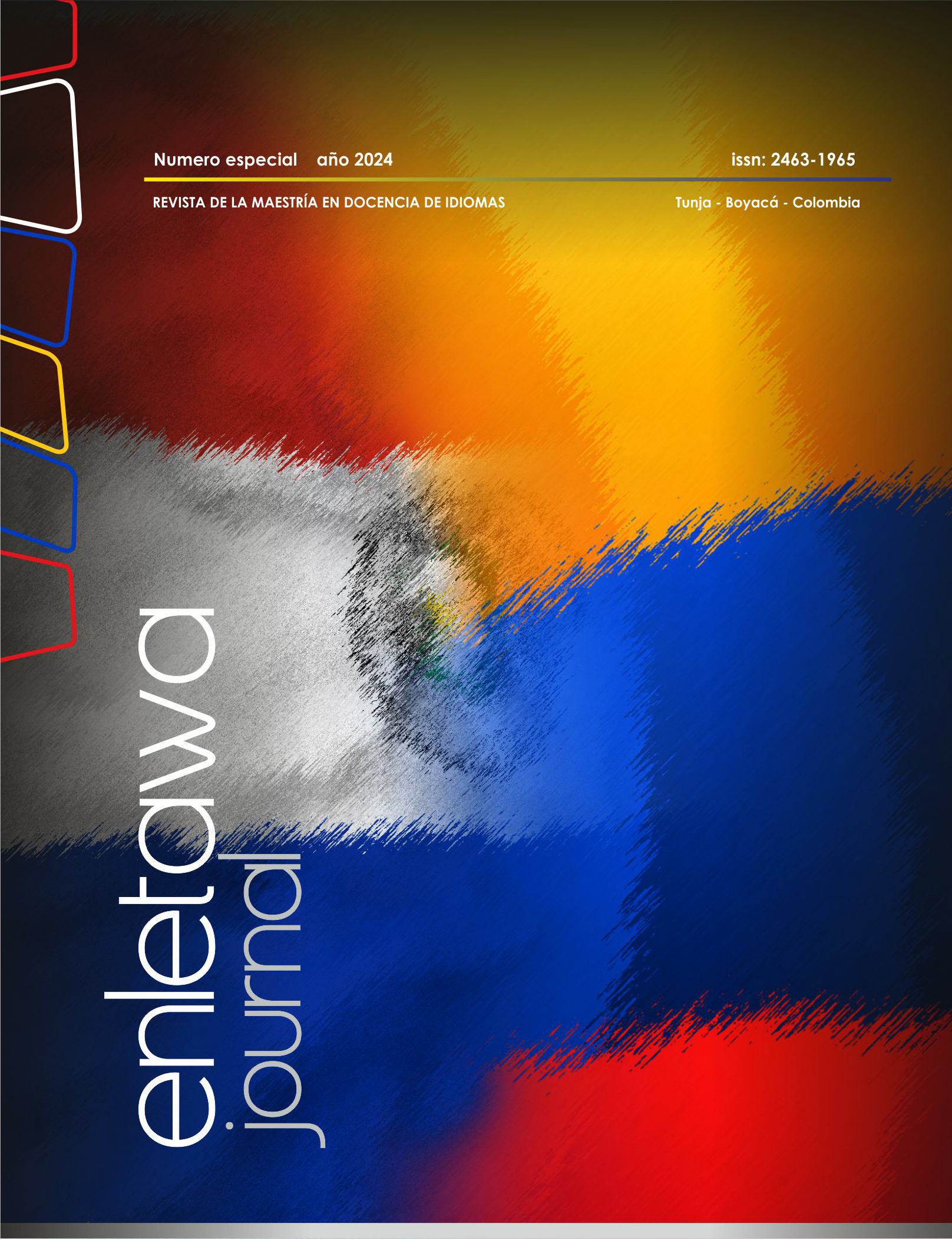ELT Collaborative Materials: A Pedagogical Proposal for Paraguay

Abstract
This project examines the efficacy and applicability of providing pedagogical materials to English language educators in Paraguay. The proposed materials are designed to enhance language proficiency, critical thinking, an understanding of the relationship between global and local perspectives on language and culture, empathy, and social awareness among students in Paraguay. The project was conducted in the departments of Alto Paraná and Caaguazú with nine in-service English teachers from public and private schools and teacher training institutes. The research encompasses the following cities: Ciudad del Este, Presidente Franco, Minga Guazú, Coronel Oviedo, and San José de los Arroyos. The instruments utilized to gather the data necessary for this qualitative study were surveys, focus groups, and semi-structured interviews. The study was based on the principles of participatory action research and collaborative design of materials, a process known as co-design. The results underscore the effectiveness and relevance of designing materials in collaboration with English language teachers and adding linguistic aspects of locality and cultural components
Keywords
ELT, pedagogical materials, collaborative materials
References
- Al Tarawneh, M. (2023). Native-Speakerism in the EFL Job Market: A Corpus-Based Study of Teaching Advertisements. In 3rd International Conference on Language and Education, at Cihan University-Erbil. https://doi.org/10.24086/iclangedu2023/paper.947
- Álvarez Valencia, J. A., & Valencia, A. (2023). Indigenous Students and University Stakeholders’ Challenges and Opportunities for Intercultural Decolonial Dialogue. Profile: Issues in Teachers' Professional Development, 25(2), 219-237. https://doi.org/10.15446/profile.v25n2.102812
- Bonilla-Medina, S.X. (2023). Examining Racialized Practices in ELT: Enhancing Critical New Horizons. In C. H. Guerrero-Nieto (eds.), Unauthorized Outlooks on Second Languages Education and Policies. Voices from Colombia (pp. 209-228). Palgrave McMillan. https://doi.org/10.1007/978-3-031-45051-8_11
- Bonilla-Medina, S. X., & Cruz-Arcila, F. (2014). Critical Socio-Cultural Elements of the Intercultural Endeavour of English Teaching in Colombian Rural Areas. PROFILE Issues in Teachers' Professional Development, 16(2), 117-133. https://doi.org/10.15446/profile.v16n2.40423
- Bonilla-Medina, S. X., Varela, K. V., & García, K. (2021). Configuration of Racial Identities of Learners of English. Profile: Issues in Teachers' Professional Development, 23(2), 137-150. https://doi.org/10.15446/profile.v23n2.90374
- Canese, V. & Spezzini, S. (Eds). (2023). Teaching English in Global Contexts, Language, Learners, and Learning. Editorial Facultad de Filosofía -UNA.
- Castañeda-Peña, H., Ubaque-Casallas, D. & Delgado-Ochoa, J. (2022). Embodied Gender/Sex Identity and English Language Teaching: Two Narratives and Dissident Identities from Colombia. Issues in Educational Research, 32(3), 906-924. https://www.iier.org.au/iier32/castaneda-pena.pdf
- Cazuriaga Flores, M. I., & Villalba Acosta, C. M. (2024). Needs Analysis for English Teaching Materials at a Public High School in Concepción, Paraguay [Unpublished bachelor’s thesis]. Universidad Nacional de Asunción, Facultad de Filosofía, Instituto Superior de Lenguas.
- Creswell, J. W., & Creswell, J. D. (2018). Research Design: Qualitative, Quantitative, and Mixed Methods Approaches. Sage Publications.
- Dörnyei, Z. (2014). Questionnaires in Second Language Research: Construction, Administration, and Processing. Routledge.
- Freire, P. (1970). Pedagogy of the oppressed. Herder and Herder.
- Gómez Rodríguez, L. F. (2015). The Cultural Content in EFL Textbooks and What Teachers Need to Do About It. PROFILE Issues in Teachers' Professional Development, 17(2), 167-187. https://doi.org/10.15446/profile.v17n2.44272
- Kemmis, S., & McTaggart, R. (2000). Participatory Action Research. In N. K. Denzin & Y. S. Lincoln (Eds.), Handbook of Qualitative Research (pp. 567-606). Sage Publications.
- Kumaravadivelu, B. (2003). Beyond Methods: Macrostrategies for Language Teaching. Yale University Press.
- Macías, D. F. (2010). Considering New Perspectives in ELT in Colombia: From EFL to ELF. HOW, 17(1), 181-194.
- Macías, D. F., & Mosquera‐Pérez, J. E. (2024). English as a Lingua Franca, World Englishes, and the Preparation of Language Teachers: An Awareness‐Raising Experience in an English Teacher Education Program in Colombia. TESOL Journal, 15(3). https://doi.org/10.1002/tesj.789
- Mahboob, A. (2011). English: The Industry. Journal of Postcolonial Cultures and Societies, 2(4), 46-61.
- Marshall, M. N. (1996). Sampling for Qualitative Research. Family Practice, 13(6), 522-526. https://doi.org/10.1093/ fampra/13.6.522
- Matsuda, A. (2012). Principles and Practices of Teaching English as an International Language. Multilingual Matters.
- Mosquera-Pérez, J. E., (2024). English as a Lingua Franca and World Englishes in ELT: Challenges and Opportunities for Materials Development and Implementation. ETAS Journal, 1-2.
- Mosquera-Pérez, J. E. (2024, April 26). Transcultural Awareness, Global Englishes and ELT: A Conversation with Dr Will Baker video. YouTube. https://www.youtube.com/watch?v=F7wyZgxUDHk&t=1964s
- Núñez-Pardo, A. (2022). Indelible Coloniality and Emergent Decoloniality in Colombian-Authored EFL Textbooks: A Critical Content Analysis. Íkala, Revista de Lenguaje y Cultura, 27(3), 702-724. https://doi.org/10.17533/udea.ikala.v27n3a07
- Núñez Pardo, A., Castellanos Jaimes, J., & Téllez Téllez, M. F. (2017). Teacher-Developed Materials in a Master 's Programme in Education with Emphasis on English Didactics. In A. Núñez Pardo, M. F. Téllez Téllez, & J. Castellanos Jaimes (Eds.), The Role of Teacher-Developed Materials in Fostering English Language Skills (pp. 19-64). Universidad Externado de Colombia.
- Núñez Pardo, A., & Téllez Téllez, M. F. (2015). Reflection on Teachers’ Personal and Professional Growth through a Materials Development Seminar. HOW, 22(2), 54-74. https://doi.org/10.19183/how.22.2.151
- Núñez-Pardo, A., & Téllez-Téllez, M. F. (2021). Defying Culture Hegemony through Teacher Generated EFL Materials. Universidad Externado de Colombia, Facultad de Ciencias de la Educación.
- Núñez Pardo, A., Téllez Téllez, M. F., & Castellanos Jaimes, J. (2017). Materials for the Learning of English and Teachers' Professional Growth. Universidad Externado de Colombia.
- Pennycook, A. (2006). Global Englishes and Transcultural Flows. Routledge.
- Ramos Holguín, B., & Aguirre Morales, J. (2024). The Implications of Designing Materials for English as a Foreign Language (EFL) Courses. In R. L. Saber, A. G. da Silva, A. P. Trevisani, & A. E. Blanco Estupiñán (Eds.), Humanidades e educação contemporânea: Desafios e perspectivas (pp. 36-43). Universidade Estadual do Paraná.
- Reagan, T. (2004). Objectification, Positivism and Language Studies: A Reconsideration. Critical Inquiry in Language Studies, 1(1), 41-60. https://doi.org/10.1207/s15427595cils0101_3
- Stringer, E. T. (2013). Action Research. Sage Publications.
- Tomlinson, C. A. (2001). How to differentiate instruction in mixed-ability classrooms. ASCD.
